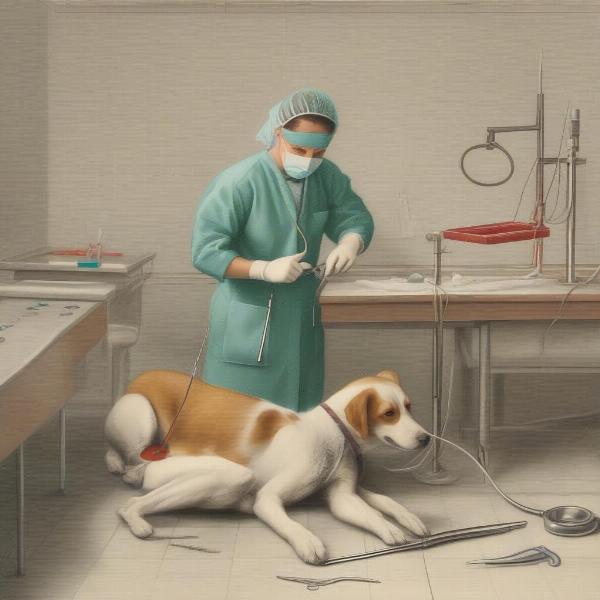Losing a beloved dog after bladder stone surgery is a devastating experience. While this procedure is generally considered safe, complications can occur. This article will explore the potential risks associated with bladder stone surgery in dogs, discuss why these complications might arise, and offer advice on coping with the grief of losing your furry friend. We’ll also provide guidance on how to discuss your concerns with your veterinarian and what questions to ask before making a decision about surgery.
 Risks of Bladder Stone Surgery in Dogs
Risks of Bladder Stone Surgery in Dogs
One of the most challenging aspects of pet ownership is facing difficult medical decisions. Bladder stones, a common canine health issue, often require surgical removal. Although generally safe, complications can arise. Understanding these potential risks is crucial for informed decision-making. These risks can include bleeding, infection, urinary tract damage, and adverse reactions to anesthesia. While rare, death can also occur.
Why Complications Can Occur After Bladder Stone Surgery
Several factors can contribute to complications after bladder stone surgery. Pre-existing health conditions, such as kidney disease or diabetes, can increase the risk. The size and type of bladder stones, as well as the surgical technique used, can also play a role. Sometimes, complications can arise due to unforeseen circumstances during the procedure or post-operative infections.
Coping with the Loss of Your Dog
The loss of a dog, especially under such unexpected circumstances, can be incredibly painful. Allow yourself time to grieve and don’t be afraid to seek support from friends, family, or a pet loss support group. Remembering the happy times you shared with your dog can be a source of comfort during this difficult period. Creating a memorial, such as a photo album or a special place in your garden, can also help you honor your dog’s memory.
Discussing Your Concerns with Your Veterinarian
Open communication with your veterinarian is vital. Before the surgery, discuss your dog’s overall health, any pre-existing conditions, and the specific risks associated with the procedure. Don’t hesitate to ask questions about alternative treatment options and the potential outcomes of each approach. A thorough discussion will help you make an informed decision that is best for your dog.
Questions to Ask Your Vet Before Bladder Stone Surgery
- What are the different types of bladder stones my dog could have?
- What are the risks and benefits of surgery versus other treatment options?
- What is the estimated recovery time?
- What kind of post-operative care will my dog require?
- What are the potential complications, and what are the signs to look out for?
Conclusion
While bladder stone surgery is often necessary and generally successful, it’s crucial to understand the potential risks and be prepared for any outcome. Open communication with your veterinarian, coupled with thorough pre-operative assessment and diligent post-operative care, can significantly reduce the risk of complications. Should the worst happen, remember that grieving the loss of a beloved pet is a natural process. Seeking support and cherishing the memories you shared can help you navigate this challenging time.
FAQ
- What are the symptoms of bladder stones in dogs? Symptoms can include straining to urinate, bloody urine, frequent urination, and accidents in the house.
- Can bladder stones be prevented? Dietary changes and increased water intake can help prevent certain types of bladder stones.
- Are there non-surgical options for treating bladder stones? Some small stones may be dissolved with special diets, but larger stones usually require surgery.
- How long does bladder stone surgery typically take? The procedure usually takes between 30 minutes to an hour, depending on the complexity.
- What is the prognosis for dogs after bladder stone surgery? The prognosis is generally good with proper post-operative care and follow-up.
- When should I contact my vet after the surgery? Contact your vet immediately if you notice any signs of complications, such as lethargy, loss of appetite, vomiting, or difficulty urinating.
- How can I help my dog manage pain after surgery? Your vet will prescribe pain medication and provide instructions on how to administer it.
ILM Dog is a leading international online resource dedicated to providing expert advice on dog care and wellbeing. From breed selection to health and nutrition, training and behavior, to grooming and product recommendations, we offer comprehensive and reliable information to dog owners worldwide. Our expert team is committed to helping you provide the best possible care for your canine companion. Whether you are a seasoned dog owner or just starting your journey, ILM Dog is your trusted source for all things canine. Contact us today for personalized advice: Email: [email protected], Phone: +44 20-3965-8624.